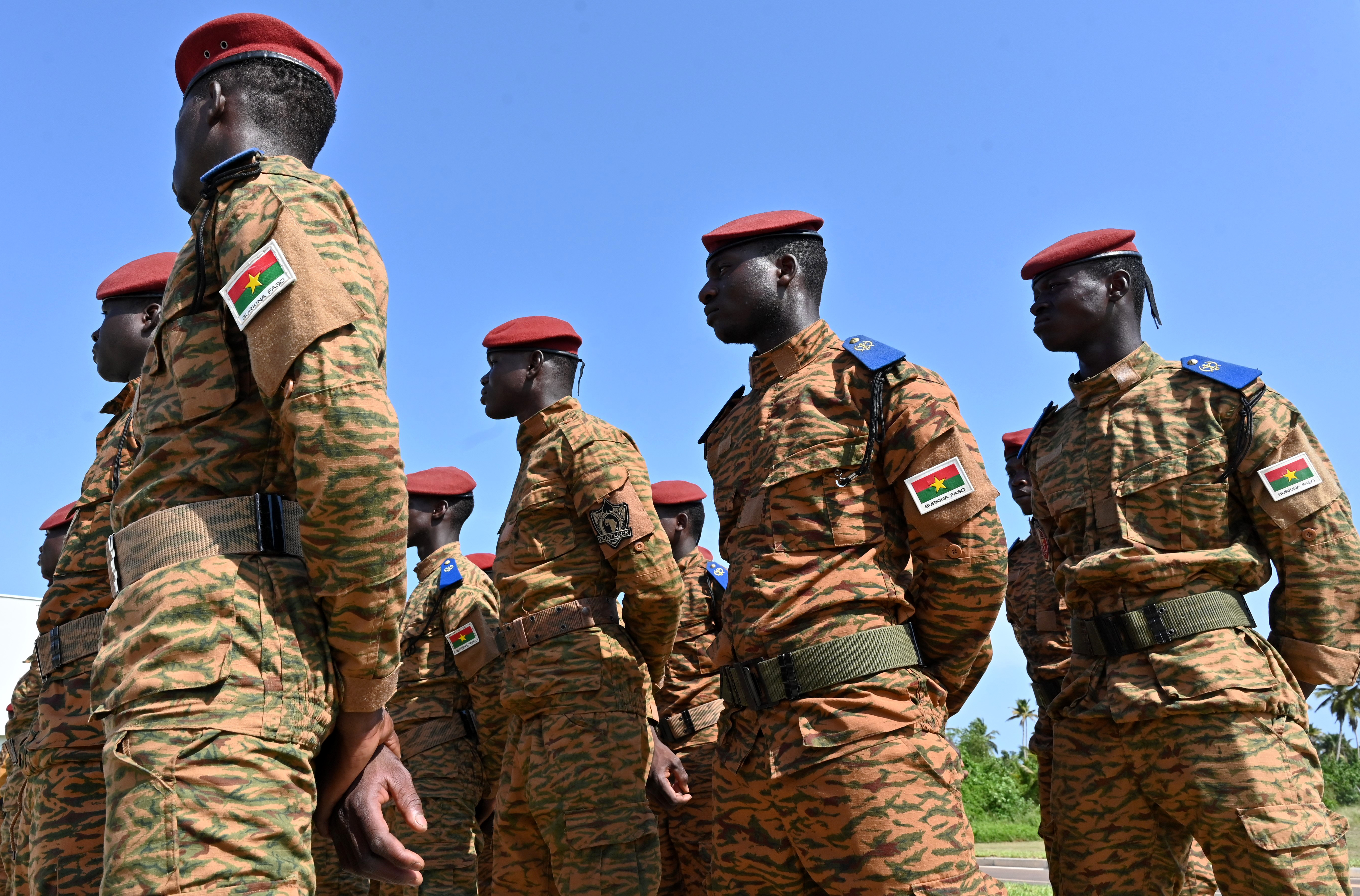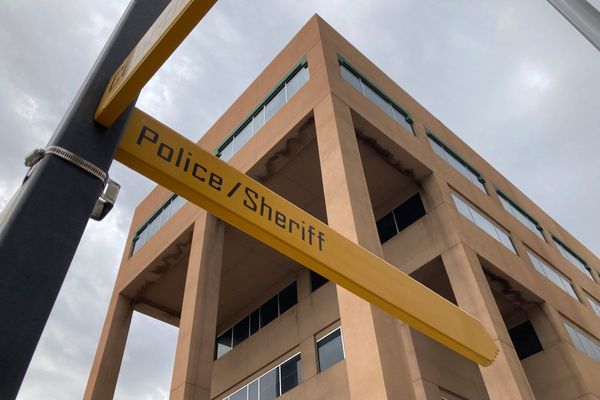
Recent shootings, first at the presidential palace, and then, at the site of a public broadcaster, in capital Ouagadougou, are fuelling suggestions that Burkina Faso may be edging towards another mutiny, amid a growing security crisis in the country.
Military leader Captain Ibrahim Traore, – or “IB” as he is called locally – promised to secure the fighting-ravaged West African country, hold elections, and expedite the country’s transition to democracy when he first seized power in a coup in 2022. That coup followed earlier military takeovers in neighbouring Mali and Guinea.
However, in early June, Traore announced a five-year extension of the transition, citing continuing insecurity in the country’s northeast regions, where the military is battling two armed groups that now control nearly half of Burkina Faso. Critics have accused Traore of using the security challenges to try to extend his hold on power.
But recent events have prompted questions over his control, and what the Burkinabe government might do to fend off any internal threats, say analysts.
What happened on June 11?
Amid intense fighting in the country’s ongoing battles with armed groups linked to al-Qaeda and ISIL (ISIS), an analyst in Ouagadougou who requested anonymity said a devastating loss for Burkinabe troops in June has amplified feelings of dissatisfaction in the army towards Traore’s government.
On June 11, fighters of the Jama’at Nusrat al-Islam wal-Muslimin (JNIM) launched attacks on forces stationed at an army base in the village of Mansila, near the border with Niger, in Burkina Faso’s northeastern region.
Dozens of soldiers were killed in the offensive – 107, according to JNIM’s statements this week. Analysts said it was one of the worst setbacks, in terms of losses, that the military has suffered since fighting first spilled over from neighbouring Mali in 2015.
In several videos shared online by JNIM propaganda accounts, the group’s fighters can be seen clad in military fatigues and perched on motorcycles, aiming gunfire at the army base. About seven Burkinabe soldiers are believed to have been captured. JNIM videos also showed the group displaying its battle spoils: an array of Kalashnikov rifles, hundreds of bullets, and scores of other military-grade weapons.
The TV station
The country was still reeling from that loss when at about 3pm on June 12, gunshots rang out around the premises of the Radio Television du Burkina (RTB), the national television network in Ouagadougou. The station is close to the presidential palace where Traore was meeting with a council of ministers at the time.
Public broadcast stations are often early targets of rebels during coups, as it’s where new leaders have traditionally announced that they’ve seized power.
❗️❗️Incident à OUAGADOUDOU
Selon des sources variées, le conseil des ministres présidé par Ibrahim Traore a été
interrompu cet après midi par des tirs à la RTB, proche du palais de Koulouba.L’AIB confirme un "incident de tir". 🤔#ouagadougou #burkinafaso #ibrahimtraore pic.twitter.com/wV5Q94skKp
— Cap’Ivoire Info (@CapIvoire_Info) June 12, 2024
In a video report by the RTB and photos online, cars on the station’s premises looked to be riddled with bullet marks, and signs of a projectile that landed in the compound were noticeable. Two people suffered “minor” injuries and were treated and released, authorities said of the attack.
Authorities kept mute initially. On Thursday, Traore visited the broadcaster and claimed it was friendly fire.
“Those who are there to protect you are the ones who unfortunately caused the incident,” he said. “It’s part of their duties; in wanting to check a certain number of things, unfortunately someone (mistakenly) fired the shot.”
Earlier, on May 17, local media reported shootings around the presidential palace itself. There are scant details of that attack, but official statements claim a lone armed person attacked guards stationed at the palace and was quickly subdued.
What has the government said?
Online, rumours swelled of dissent within the army after the Mansila attacks, even as the government’s leaders kept mute on the killings of the soldiers.
When Traore went unphotographed for a few days between June 12 and June 14, and did not release any statements, speculation over his whereabouts mounted. An alert from army chief General Celestin Simpore for troops to be ready at their barracks on June 13, and hovering helicopters over Ouagadougou that day, added to the uncertainty.
On June 14, however, Traore shared images where he is seen donating blood at his residence. On Thursday, while speaking at RTB, the military leader refuted mutiny claims and chided “lying” Western media channels.
“There’s absolutely nothing to it,” he said, adding that the hovering helicopters were carrying reinforcing troops to Mansila. “We are here. We mustn’t listen to these individuals who are trying to distract people. We’re not running away. We’re not backing down, we’re not giving up”.
En cette Journée mondiale du donneur de sang, je salue les efforts du Centre national de transfusion sanguine (CNTS), des associations de promotion du don de sang et des donneurs bénévoles qui œuvrent à garantir la disponibilité du sang et des produits sanguins dans les hôpitaux… pic.twitter.com/fLT9tr0mz7
— Capitaine Ibrahim TRAORÉ (@CapitaineIb226) June 14, 2024
Analysts, however, say big attacks are often precursors to realignments in the military, and thus, rebellion.
There are also real fears, experts say, that the recent shootings could trigger more extreme reactions from Traore. Since two earlier coup attempts were thwarted in September and then, in January this year, analysts say Traore has grown increasingly tough on those perceived to be enemies – military or civilian.
Dozens of people accused of plotting the coups have been arrested, while many in the military suspected of being involved have reportedly been sent on foreign missions, for example.
“It’s kind of modelled as they’re going on “re-education” training, but when soldiers who criticise you end up being sent to Russia, it doesn’t look good,” said analyst Dan Einzega of the US-based Africa Center for Strategic Studies.
Activists, journalists or politicians critical of the government have also disappeared or been forcefully sent to the front lines to join the military. A new decree allows the government to conscript anyone above 18 years, a law Human Rights Watch and other rights groups have condemned.
Meanwhile, several international media organisations, such as French agencies like RFI and TV5 Monde, have been suspended.
Has insecurity worsened under Traore?
Yes – say analysts who point to increasing violence in the country.
Since he seized power in a counter-coup, Traore has distanced Burkina Faso from France, its colonial ruler that has long been a major aid partner and military ally. Last year, some 400 special operations French troops pulled out of the country as relations between the two countries deteriorated.
Traore’s supporters, who rally behind his anti-France rhetoric, praise his government for detaching the country from Paris’s influence. They point to how military spending has doubled under Traore, to the creation of a special rapid support force meant to help the stretched forces in the north, and to government offensives with drones and helicopters. The military government has also touted a scheme aimed at recruiting 50,000 volunteers to the Volunteers for the Defense of the Homeland (VPD), a self-defence militia aiding the military.
However, critics point out that Traore has ended previous locally led dialogues with the armed groups that resulted in pockets of ceasefires. Deaths more than doubled last year compared with 2022, and more than 8,000 people were killed, according to conflict tracking group ACLED.
“He has pursued total war,” Einzenga of ACSS said. “There’s good thinking behind expanding the capability of military forces but you have to do it in a way that’s effective and protects citizens. Taking negotiations off the table doesn’t seem smart.”
As Ouagadougou has pulled away from France, it has turned to Russia. Traore has had several calls with President Vladimir Putin and unconfirmed reports say some 100 fighters from the Wagner mercenary group arrived in the country this week – apparently flown in from neighbouring Mali, where military leader Colonel Assimi Goita has become a “big brother” for Traore. Some 1,200 Wagner troops are fighting armed groups alongside government forces in Mali.
Ulf Laessing, who heads the Sahel program at the Konrad Adenauer Foundation, told Al Jazeera that Traore’s administration had failed to recruit professional soldiers, with many volunteers only receiving short training. Some of those who have been forcefully conscripted have said they were given guns with little to no preparation.
“They’re kind of vulnerable to losses and it is not very efficient, unfortunately. Almost every day now, there are incidents like this,” he said. “The government is trying hard, they’re buying weapons, they have a military partnership with Russia but they’re not very successful.”
What’s the humanitarian situation?
Thousands of people have been forced to leave their homes in the fighting zones in the north and northeast, caught between the military and armed groups. About one in every 10 people in the country are now displaced. More than 5,000 schools have shut down.
Others don’t have the luxury of fleeing territories controlled by armed groups. By the end of 2023, some two million people were trapped in 36 villages that are, in effect, blockaded by armed fighters – it is unsafe for civilians to leave, and food and medicine barely trickle in.
The military too, accused by activists of severe rights abuses against residents it thinks are loyal to its enemies, has cordoned off some areas, effectively halting trade.
Most of the displaced have clustered in Djibo, the capital of the northern Soum Province, which has had its population increase from 60,000 to nearly half a million people since 2019. The town itself is largely cut off from aid.
The insecurity, combined with high inflation and the punishing Sahelian climate, has pushed up malnutrition rates. Some 1.4 million children are expected to face crisis levels of hunger by June, when the lean period between harvests starts, according to Save the Children.
Meanwhile, funding appeals have only attracted a tiny fraction of the needed money, aid groups say, as Burkina Faso battles for relevance in myriad crises. The Norwegian Refugee Council in June said the country represented the most neglected crisis in the world for the second year running.







